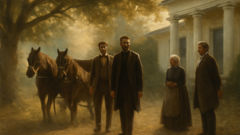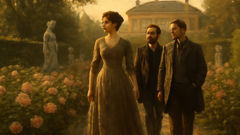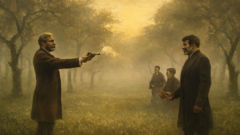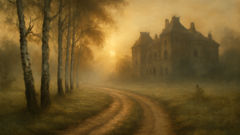Introduction
A misty dawn settles gently over the fields of the Russian estate, where the pale sun begins its climb over the endless, undulating horizon. Dew sparkles on wild grasses and the edges of poplar leaves, and a sleepy wind stirs the birches bordering the muddy, rutted road that leads away from the manor house. The quiet is vast—broken only by the distant lowing of cattle, the caw of a solitary rook, and the slow, rhythmic clop of hooves approaching from afar. In this moment, the timeless Russian countryside feels untouched by the march of change, caught in a serene hush before the day erupts into labor and conversation. Yet beneath this tranquil surface, the world is shifting. The year is 1859, a time when old certainties are beginning to unravel, when the whisper of progress and unrest stirs even the most remote corners of rural Russia. The manor’s windows, framed by faded shutters, reflect the dawn in wavering patches of gold and shadow; within, the rooms hold the lingering scent of samovar tea and the murmur of generations past. It is here that Ivan Arkadyevich, a young man brimming with ideas, returns from the university in Petersburg, his satchel heavy not only with books but with questions and doubts that echo the changing times. At his side is his friend, Yevgeny Bazarov—sharp-eyed, unsentimental, and fiercely proud of his own reasoned nihilism. Their arrival will ignite a collision of worlds: the reverence for tradition embodied by Ivan’s gentle father, Arkady Petrovich, and the restless hunger for new truths that the younger men carry. As the horses clatter into the courtyard and the servants rush to greet them, the air bristles with anticipation and a touch of unease. The stage is set for a summer that will test loyalties, break hearts, and reveal the deep fissures—both personal and philosophical—that separate fathers from sons. Through the long days and white nights, amid family meals, countryside walks, and passionate debates, these men and those around them will confront not only one another but the question of how to live honestly in a world where everything seems to be changing. The story that unfolds is one of love and loss, pride and humility, and the relentless passage of time that binds generations even as it drives them apart.
The Return
Ivan Arkadyevich leaned out the carriage window as the estate came into view, its familiar white columns rising from the tangle of overgrown gardens. His heart fluttered with a strange mix of longing and apprehension. Next to him, Yevgeny Bazarov sat stiff-backed and silent, gazing with cold interest at the passing meadows. “Home at last,” Ivan whispered, more to himself than to his friend. The word sounded oddly foreign, its meaning already colored by the months he’d spent away at university, where new ideas had thrived and old certainties seemed to wilt under scrutiny.

The carriage clattered over the rutted stones and came to a halt beneath a spreading linden tree. The housekeeper, grey-haired and stooped, hurried to greet them, her eyes shining with barely contained emotion. Ivan’s father, Arkady Petrovich, appeared on the steps, his face crinkled with anticipation and worry. He opened his arms, and Ivan embraced him, feeling the bones beneath his father’s coat and the tremor of years spent waiting for this moment. Bazarov watched the reunion with an inscrutable gaze, then nodded politely as Arkady turned to greet him. “Welcome, Yevgeny Vassilievich. You are most welcome in our home,” Arkady said, his voice warm yet tinged with uncertainty.
Dinner that evening was a symphony of awkwardness and affection. The table groaned with dishes—roast duck, kasha, fresh cucumbers from the garden—while the samovar steamed in the corner. Ivan answered his father’s questions dutifully, but he felt the gulf between them widening with every word. Bazarov, for his part, dissected the meal with an almost clinical detachment, sparing only a few polite remarks. When Arkady raised the topic of reforms and the future of Russia, Bazarov leaned forward, his eyes gleaming. “There’s little sense in talking about reform, sir, unless we’re willing to overturn the entire rotten edifice,” he said quietly. The silence that followed was thick as cream. Arkady smiled, uncertain. Ivan’s cheeks flushed, caught between filial loyalty and intellectual excitement.
The following days passed in a blur of countryside walks and tense conversations. Bazarov prowled the estate like a restless wolf, studying plants in the orchard and discussing science with Ivan in long, rambling talks. The servants regarded him with suspicion, their superstitions prickling in the face of his cool rationality. One afternoon, Ivan found his father sitting in the study, leafing through an old book of poetry. “You used to love these verses, Vanya,” Arkady said softly. Ivan looked away, unable to explain why the words now felt hollow. He saw the sorrow etched into his father’s face—the sorrow of a man watching his own relevance slip quietly away.
One evening, a neighbor arrived: Pavel Petrovich, Arkady’s older brother—a man of impeccable manners, starched collars, and tragic dignity. Pavel eyed Bazarov with a mixture of fascination and disdain, probing him with sharp questions over dinner. “So you believe in nothing at all, young man?” Pavel asked, raising an eyebrow. “Nothing that cannot be proved,” Bazarov replied. The answer hung between them like the echo of a distant bell, setting the tone for the weeks to come. As summer deepened, the generational divide—once a faint crack—became a chasm. Yet beneath the quarrels and philosophical skirmishes, something deeper simmered: love, unspoken regrets, and the ache of dreams deferred.
Hearts Awakened
A week after their arrival, the monotony of rural life was interrupted by an invitation to a neighboring estate—the home of Anna Sergeyevna Odintsova, a young widow renowned for her wit and intelligence. Ivan and Bazarov accepted with curiosity. Anna’s estate shimmered with elegance: manicured gardens, marble statues, and laughter drifting from shaded verandas. Anna herself greeted them with a gracious smile and a frank, searching gaze. Conversation at her table sparkled with insight and irony. Ivan felt instantly out of his depth but was drawn to Anna’s warmth. Bazarov, meanwhile, seemed both intrigued and irritated by her intellect.

In the days that followed, Ivan found himself wandering Anna’s garden with her, their discussions ranging from French literature to the future of Russia. Ivan was intoxicated by her presence—the way she listened, the quiet power she wielded in every glance. Yet he struggled to express himself, tripping over the boundaries between admiration and longing. Bazarov, on the other hand, kept his distance at first, dismissing Anna’s salons as trivial distractions. But Anna saw something in Bazarov that others missed: a vulnerability hidden beneath his ironclad skepticism.
One afternoon, as storm clouds gathered above the orchard, Anna invited Bazarov for a walk. They discussed science and society, each probing the other’s beliefs. Anna challenged Bazarov’s nihilism gently but firmly. “Is it truly freedom to believe in nothing?” she asked, her eyes steady. For the first time, Bazarov hesitated. He was unsettled by Anna’s clarity—and by a flicker of feeling he could not name. That evening, as rain lashed the windows, Anna played piano in the drawing room. Ivan watched her fingers move over the keys, his heart aching with hope and fear. Bazarov stood in the shadows, torn between scorn and longing.
The days grew heavy with unspoken emotions. Ivan, emboldened by Anna’s kindness, confessed his feelings to her one starlit evening. Anna listened gently but told him she could not return his love; her heart, she said, was not hers to give. Ivan walked home alone through dew-soaked grass, his dreams dissolving into sorrow. Meanwhile, Bazarov found himself visiting Anna more frequently, drawn by arguments that left him both exhausted and strangely alive. Their debates grew more personal, until one dusk, in a moment of rare vulnerability, Bazarov kissed her. Anna recoiled—not with anger, but with a sadness he could not bear. She thanked him for his honesty but told him their worlds could never truly meet.
For Ivan and Bazarov alike, the summer’s promise gave way to heartache. Ivan retreated into silence, haunted by what might have been. Bazarov threw himself into his studies, but nothing could quiet the turmoil inside him. Anna watched them both with compassion, her own heart heavy with regrets she would never voice.
Wounds and Revelations
As summer waned, tensions at Ivan’s family estate reached a boiling point. The ideological debates between Pavel Petrovich and Bazarov became almost daily rituals, each more heated than the last. Pavel saw in Bazarov not just an opponent but an omen—the death knell of everything he held dear. For Bazarov, Pavel represented the fossilized past he was determined to uproot. The two circled each other with words sharp as sabers, while Ivan and his father watched helplessly from the sidelines.

One morning, after a particularly bitter exchange about honor and duty, Pavel issued a challenge. “If you have such little regard for tradition, perhaps you would care to defend your beliefs in a more direct manner,” he said coldly. Bazarov agreed without hesitation. At dawn the next day, the two men faced each other in the misty orchard, pistols in hand. The duel was brief but terrible: Pavel was wounded, the bullet grazing his thigh. As blood bloomed on his trousers, Arkady rushed to his brother’s side, his face stricken with horror. Bazarov dropped his pistol and knelt, hands trembling—not from fear, but from the realization that his actions had real, irreparable consequences.
The incident cast a pall over the household. Pavel’s injury was not fatal, but his pride would never fully heal. Ivan tended to his uncle’s wound in silence, unable to find words for the sorrow that filled him. Bazarov withdrew even further into himself, haunted by shame and doubt. He packed his bags in the night and left without farewell, leaving Ivan a brief note: “There is no place for me here.”
With Bazarov gone, Ivan wandered the estate in a fog of grief. He felt the weight of all he could not say—to his father, to Anna, to himself. One evening, Arkady found his son sitting beneath the old linden tree. “I am sorry if I’ve disappointed you,” Ivan whispered. Arkady shook his head gently. “You have grown into your own man. That is all a father can hope for.” In that quiet moment, the gulf between them seemed to narrow, if only by a little.
Far from the estate, Bazarov wandered from town to town, tending to peasants and burying himself in work. But his heart was no longer armored against the world. When he fell ill with typhus—caught while treating a sick villager—he sent a letter to Ivan: “Forgive me for everything. I see now that nothing is simple.” Ivan hurried to Bazarov’s side, but arrived too late. In his final hours, Bazarov confessed his love for Anna and his regret for what pride had cost him. “Perhaps we are not so different from our fathers, after all,” he murmured before closing his eyes for the last time.
Conclusion
When autumn’s chill finally swept across the estate, Ivan found himself standing alone beside the quiet grave of his friend. The summer’s chaos had faded into a memory tinged with both pain and tenderness. The fields lay fallow, the linden leaves yellowing and drifting down to rest on worn stones. At home, Arkady moved more slowly than before, his eyes shadowed but gentle. Pavel walked with a cane, his dignity undimmed but touched by resignation. Anna Sergeyevna, distant yet always present in Ivan’s thoughts, had returned to her own pursuits—a symbol of all that might have been but could never truly belong to him.
Ivan realized that change—so feared by one generation and so craved by another—was as inevitable as the turning of the seasons. He had loved, argued, lost, and grown; he saw in his father not just an artifact of the past but a fellow traveler on life’s uncertain road. The lessons learned were not those he had sought at university, but the quiet wisdom of forgiveness, acceptance, and enduring love. The estate would pass from father to son and, in time, perhaps to another generation still more restless and bold. What mattered most was not the ideas they clung to or discarded, but the capacity to understand one another—across years, disappointments, and silent hopes.
As Ivan left the graveyard and made his way back to the house—now smaller against the vastness of the Russian sky—he felt a measure of peace settle within him. The world would keep turning, traditions would yield to change, and fathers and sons would continue to meet at that fragile border between reverence and rebellion. In that endless dance, each would discover their own place—and, perhaps, forgive both themselves and each other.













